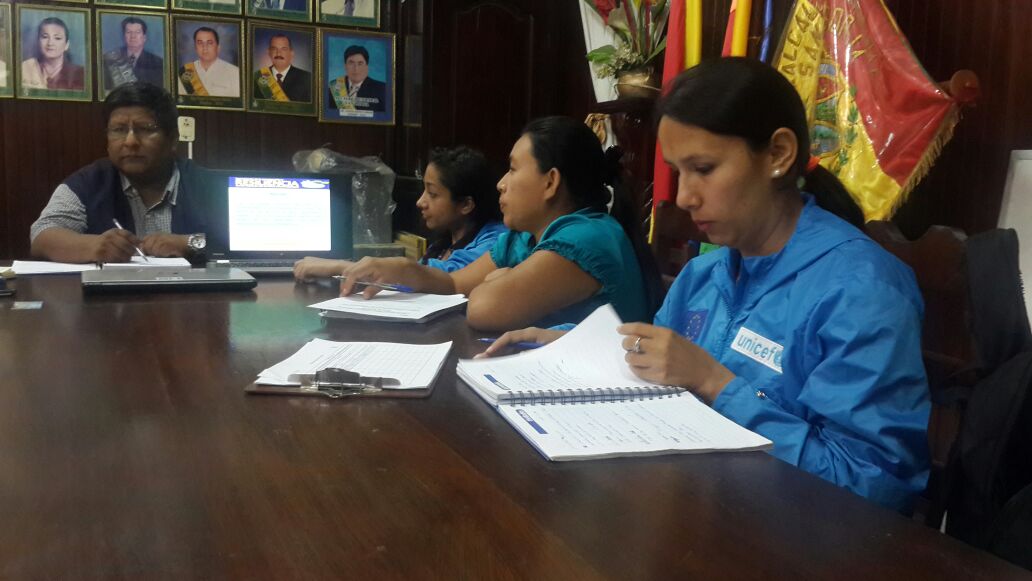 As part of the activities of the project team comprised of specialists in water and nutrition initiate the stage of coordination and presentation of the project to local authorities, health centers and local authorities in the municipalities of San Borja, San Ignacio de Moxos, San Ramon, San Joaquin and Santa Ana de Yacuma the department of Beni.
As part of the activities of the project team comprised of specialists in water and nutrition initiate the stage of coordination and presentation of the project to local authorities, health centers and local authorities in the municipalities of San Borja, San Ignacio de Moxos, San Ramon, San Joaquin and Santa Ana de Yacuma the department of Beni.
The project places special emphasis on the components of local disaster management, institutional linkage, small-scale infrastructure, building local capacity and promoting validated strategies for families and vulnerable institutions in order to eliminate the adverse effects of climate change and natural disasters, especially floods.
Through the project will strengthen and increase preparedness and resilience in vulnerable indigenous communities prioritized and organizations, with components involving water, sanitation, hygiene and nutrition for the community or society exposed to a threat, they can resist, absorb, adapt and recover from the adverse effects of timely and effective manner.
The proposed goals in water, sanitation and hygiene strengthen the capacities of CAPyS for sustainability of water and sanitation, monitoring and control of water quality at community level, build capacity in water and sanitation at the departmental, municipal and community riverine basins of Beni and Mamore Rivers and beneficiary institutions for prevention, care and emergency recovery from adverse events.
The proposed goals nutrition generate updated nutritional assessment and ASH information and promotion of hygiene nutrition before, during and after the emergency, to help strengthen the institutional framework of the Integrated Nutrition Units (UNI) in 5 municipalities benefited, creation and strengthening the network of local promoters in nutrition 5 beneficiary municipalities, build capacity in nutrition at the departmental level, municipal, personal and health promoters, riverine communities of the basins of the rivers Beni and Mamore and institutions benefited technicians prevention, care and emergency recovery by recurrent adverse events.
Background
The pilot project “RESILIENCE in River Basins Beni and Mamore” is funded by the Department for Humanitarian Aid and Civil Protection of the European Commission; for the implementation of the project it has created the Victoria Regia Consortium, which consists of the Vice Ministry of Civil Defense, Food and Agriculture Organization (FAO), UNDP – Bolivia, UNICEF, Foundation Sumaj Huasi Help action, Practical, IOM -IOM and Chiristian aid.
The project includes 4 results, which is in charge of the aforementioned institutions: the result 1 includes “The state and communities prioritized in River Basins Beni and Mamore strengthen their capacities to reduce flood risks, using timely hydrometeorological information connected to the National Early Warning System for Disaster “that is in charge of FAO and the NGO practical Action, the result 2 comprising” Reducing vulnerability through improved water and sanitation, nutritional practices and hygiene, strengthening municipal and departmental capabilities “, which is in charge of UNICEF’s Sumaj Huasi Foundation, the result 3 comprises” the communities strengthen their capacity to respond to emergencies, to Reduce Disaster Risk related to their livelihoods (especially food security) through new sustainable strategies “which is run by the NGO Action Aid and finally the result 4 provides” the resilience of indigenous and peasant populations in the two basins is increased through multiple processes comprehensive training and education to strengthen knowledge management of relevant actors “who is in charge of FAO jointly with Practical.
The aim of the project is to contribute to capacity development and adoption of strategies resilient local communities and institutions, to reduce their vulnerability, complementing and strengthening municipal capacities at the departmental and national levels.

Leave a Reply
You must be logged in to post a comment.